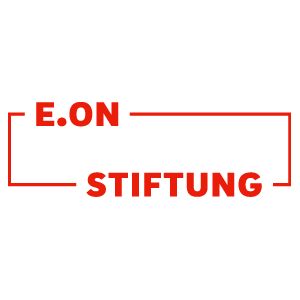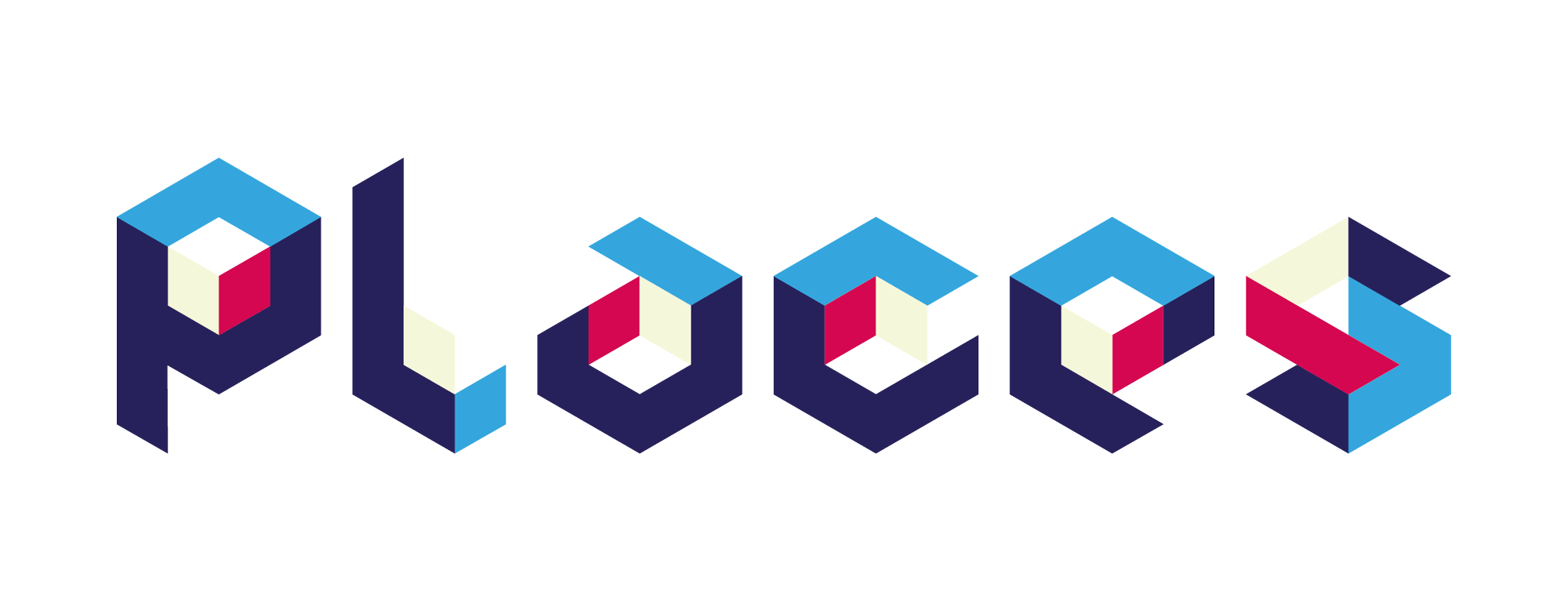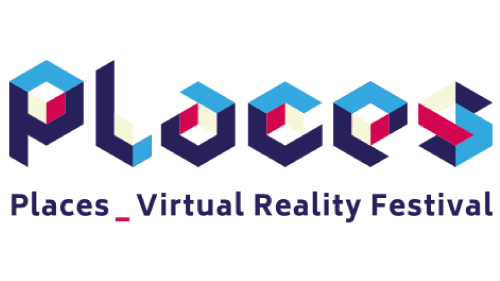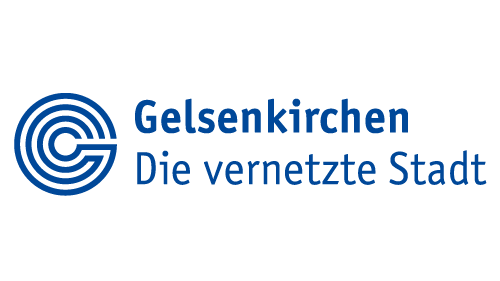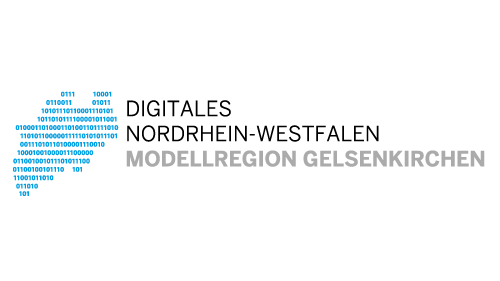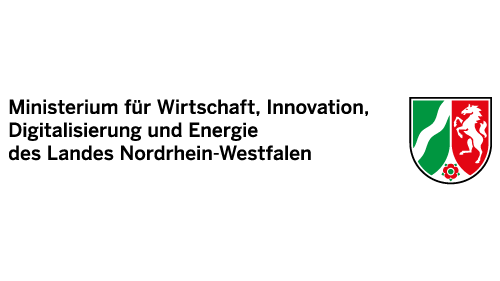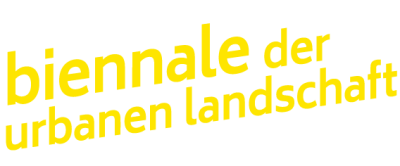
Focus Week Programme:
Digital Realities

Focus Week Programme:
Digital Realities
We are part of the Biennale of the Urban Landscape! As a partner of the event, we as the Places team are responsible for the thematic focus “Digital Realities” from 11-17 September. Here you can find all information about our programme. Under “Workshops” you will get an insight into the topics of our working session and the respective link to the registration. In the Hackathon in Residence section you can find out more about the 20 participants of the one-week hackathon. They come from all over Europe, bring a wide range of expertise with them and will spend a week developing prototypes for the sustainable city of the future. All other programme points, guided tours, excursions, panels and lectures can be found in the timetable below.
We are part of the Biennale of the Urban Landscape! As a partner of the event, we as the Places team are responsible for the thematic focus “Digital Realities” from 11-17 September. Here you can find all information about our programme. Under “Workshops” you will get an insight into the topics of our working session and the respective link to the registration. In the Hackathon in Residence section you can find out more about the 20 participants of the one-week hackathon. They come from all over Europe, bring a wide range of expertise with them and will spend a week developing prototypes for the sustainable city of the future. All other programme points, guided tours, excursions, panels and lectures can be found in the timetable below.
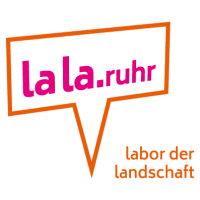
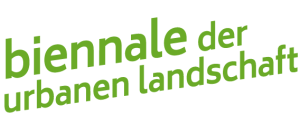
Program
Practically digital - workshops
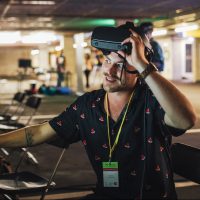
Tuesday, 13 September 2022
Designing and building in virtual reality
led by Sabrina Chmielewski and Matthias Krentzek
5:00 – 7:00p.m.
mxr lab, Bochumer Straße 109, 45886 Gelsenkirchen, Germany
Walking through a three-dimensional design of a building, a street or a park virtually with VR glasses is a great way to convey realistic spatial impressions.
This workshop starts one or two steps earlier and introduces possibilities to use virtual reality technology already in the design process. Following this approach, the 3D models are not first created with mouse, keyboard and screen, but directly in three-dimensional space. In addition to VR goggles and controllers, the tools of design here are one’s own hands. It is a fascinating way to play with shapes, positions and proportions and to discuss the resulting design ideas with others and change them live.
After an introduction to the world of virtual reality, we want to present such a VR planning tool in detail. Sufficient VR glasses are available so that all participants can test the application and create first designs.
This workshop is aimed at VR beginners as well as advanced users who have already had some experience with virtual reality. All interested parties are welcome, regardless of discipline, background or age.
Places are limited, early registration is essential.
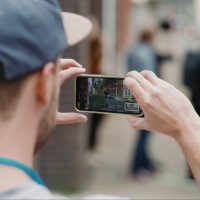
Wednesday, 14 September 2022
Augmented reality for the city of tomorrow: how we use technology practically
led by Robin Römer
5:00 – 7:00 p.m.
mxr lab, Bochumer Straße 109, 45886 Gelsenkirchen
Augmented reality makes the future of the city visible. Changes in space can be experienced playfully and the future can be shaped by citizens themselves. Today we are already walking through the city of tomorrow and inspiring everyone about the transformation to a green and sustainable city.
But it is not quite that simple. Accompanying urban planning with augmented reality is not directly better because new technology is being used. New inhibitions arise that need to be overcome and new spaces that need to be filled.
In the workshop we slip into the role of participants in an urban planning process. We try out different technical possibilities and redesign a space ourselves. In this way, we experience the limits of the design process in planning with AR. Based on guiding questions, challenges will be collected and first possible solutions for a constructive integration of AR into the urban planning process will be developed.
Places are limited, timely registration is essential.
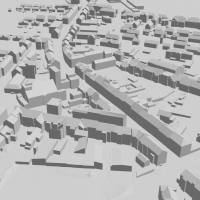
Thursday, 15 September 2022
Game Design meets Architecture
led by Alex Bednarz
5:00 – 7:00p.m
mxr lab, Bochumer Straße 109, 45886 Gelsenkirchen
On the one hand, CAD software and 3D renderings are part of architects’ and planners’ tools of the trade. On the other hand, game designers regularly design urban spaces as the setting for their games. This workshop aims to bring representatives of both worlds into contact with each other.
After an introduction to the world of game design, we want to get into an exchange and approach such daring questions as: Can a game engine help planners to simulate climate resilient buildings and places?
This workshop is especially aimed at architects and planners (and those who want to become one). You will get an insight into the basic concepts of game design. Game developers with a soft spot for sustainable architecture are also welcome, as well as – as always at lala.ruhr – all border crossers who cannot be pigeonholed.
Places are limited, early registration is essential. If possible, please bring a laptop and your own 3D projects.
Timetable Friday & Saturday
13:00-15:00Uhr
Digital Twin - and now what?
Input:
Rico Herzog (Stadtforscher, City Science Lab der HafenCity Universität Hamburg)
digital / city / development – Modelling and simulation in digital urban twins
Lukas Rissel (Projektleiter Vernetzte Stadt Gelsenkirchen)
The digital twin in the networked city and why digitalisation is not an end in itself.
Jan Ries (Projektberater “Digitaler Zwilling” München)
The Digital Twin Munich in Practice
Anschließende Podiumsdiskussion moderiert von:
Dimitri Ravin (Smart City Blogger, Herausgeber Urban Digital)
Location: Stage on the outdoor area, Munscheidstraße 14, 45886 Gelsenkirchen
15:00-16:00Uhr
Results Hackathon in Residence - Guided Tour
For the Hackathon in Residence as part of the Biennale, 20 participants from all over Europe, including the Netherlands, Great Britain, Slovenia and France, will come to Gelsenkirchen. From 12-16 September, they will be working, designing, programming and creating concrete solutions for the digital and sustainable city in mixed teams of architects, landscape architects, programmers and artists.
The challenges the interdisciplinary teams are working on are concrete tasks on the festival grounds. How can underground infrastructure be made visible, for example? What are solutions to avoid large-scale land sealing in the future? How can urban spaces be used better and more efficiently and what influence do grey and green actually have on our health?
The results of the working week can be discovered and tested during guided tours in the festival area on 16 & 17.9. In a walk of just under 20 minutes from the Science Park along Bochumer Straße, the prototypes developed by the teams during the week can be experienced and presented in the direct context of the neighbourhood. Those who cannot or do not want to take part in a guided tour can also explore the Hackathon spots on their own.
The tours start at the info point in the Arakde of the Science Park.
Tip: Parallel to the exhibition of the hackathon results, the virtual excursions take place in the mxr lab, which is located exactly halfway along the tour next to the Heilig Kreuz Kirche.
Treffpunkt: Wissenschaftspark (Munscheidstraße 14, 45886 Gelsenkirchen), Infostand am Haupteingang
15:00-18:30Uhr
VR Exkursionen
On 16 & 17 September we offer virtual excursions for which you don’t have to leave the festival area. In the mxr lab on Bochumer Straße, virtual reality beginners can take their first steps and advanced users can gain new insights into VR. The programme includes excursions into the metaverse and getting to know planning and simulation tools.
Location: mxr lab, Bochumer Straße 109, 45886 Gelsenkirchen
11:00-12:00Uhr
Results Hackathon in Residence - Guided Tour
For the Hackathon in Residence as part of the Biennale, 20 participants from all over Europe, including the Netherlands, Great Britain, Slovenia and France, will come to Gelsenkirchen. From 12-16 September, they will be working, designing, programming and creating concrete solutions for the digital and sustainable city in mixed teams of architects, landscape architects, programmers and artists.
The challenges the interdisciplinary teams are working on are concrete tasks on the festival grounds. How can underground infrastructure be made visible, for example? What are solutions to avoid large-scale land sealing in the future? How can urban spaces be used better and more efficiently and what influence do grey and green actually have on our health?
The results of the working week can be discovered and tested during guided tours in the festival area on 16 & 17.9. In a walk of just under 20 minutes from the Science Park along Bochumer Straße, the prototypes developed by the teams during the week can be experienced and presented in the direct context of the neighbourhood. Those who cannot or do not want to take part in a guided tour can also explore the Hackathon spots on their own.
The tours start at the info point in the Arakde of the Science Park.
Tip: Parallel to the exhibition of the hackathon results, the virtual excursions take place in the mxr lab, which is located exactly halfway along the tour next to the Holy Cross Church.
Treffpunkt: Wissenschaftspark (Munscheidstraße 14, 45886 Gelsenkirchen), Infostand am Haupteingang
11:00-18:30Uhr
VR Exkursionen
On 16 & 17 September we offer virtual excursions for which you don’t have to leave the festival area. In the mxr lab on Bochumer Straße, virtual reality beginners can take their first steps and advanced users can gain new insights into VR. The programme includes excursions into the metaverse and getting to know planning and simulation tools.
Location: mxr lab, Bochumer Straße 109, 45886 Gelsenkirchen
11:00-11:30Uhr
Participation and digital tools - from participation to co-creation
Talk by Steffen Budweg
From participation to co-creation – examples and experiences of the use of digital tools in a European city network for more citizen participation.
Location: Konferenzsaal, Munscheidstraße 14, 45886 Gelsenkirchen
11:30-12:00Uhr
Sustainable Artificial Intelligence
Talk by Danko Nikolić
Currently, the use of artificial intelligence requires enormous amounts of energy to train the best models. In contrast, the human brain requires comparatively tiny amounts of energy. Yet humans are smarter than AI in most tasks. The goal for the future of our technology is to develop an AI that is as energy efficient as the human brain. In his talk, Dr Danko Nikolić will explain some of the “tricks” that the human brain uses to work efficiently. One of these “tricks” is, for example, that it is able to learn from small amounts of data. In addition, our brain has the ability to switch off large parts and only use a small part of the network – only the part that is needed at any given moment. In the future, AI will also have to adopt these biological strategies in order to achieve sustainability.
Location: Konferenzsaal, Munscheidstraße 14, 45886 Gelsenkirchen
12:00-12:30Uhr
How we can arm ourselves against the consequences of climate change
Talk by Robin Römer
The last heat has just passed, the asphalt has become firm again and the rush to the bathing lake or the cooling forest outside the city has subsided. But the breathers before the next long summer are getting shorter and shorter and hot spells longer and longer. This makes it all the more important to transform our city into a cool oasis.
The transformation to a cool and green street is not new, but climate change adaptation is still not consistently considered in planning processes. That is why the E.ON Foundation has launched the “Streetplaner” project, in which microclimate analyses are brought to life through augmented reality in square and street designs in Essen.
Robin from cityscaper explains how this works and why it is a way to get more people involved in reallocating urban space.
Location: Konferenzsaal, Munscheidstraße 14, 45886 Gelsenkirchen
12:30-13:00Uhr
Does it matter what worlds make stories? Opportunities, risks & perspectives of VR/AR/XR in collaborative urban design
Talk by Imanuel Schipper
Participation, collaboration, involvement – are these both solutions to all problems and a nightmare? How can (and are) VR/AR/XR used in urban design so that multiple stakeholders have their say? Is the technology a help or rather a hurdle? Who is allowed (and able) to play along? And what do we want to achieve? What kind of world of coexistence are we building (or imagining)?
The lecture shows perspectives of collaborative digital tools and concepts for future urban design and planning on the basis of projects of the City Science Lab of the HCU Hamburg.)
Location: Konferenzsaal, Munscheidstraße 14, 45886 Gelsenkirchen
13:00-14:00Uhr
Results Hackathon in Residence - Guided Tour
For the Hackathon in Residence as part of the Biennale, 20 participants from all over Europe, including the Netherlands, Great Britain, Slovenia and France, will come to Gelsenkirchen. From 12-16 September, they will be working, designing, programming and creating concrete solutions for the digital and sustainable city in mixed teams of architects, landscape architects, programmers and artists.
The challenges the interdisciplinary teams are working on are concrete tasks on the festival grounds. How can underground infrastructure be made visible, for example? What are solutions to avoid large-scale land sealing in the future? How can urban spaces be used better and more efficiently and what influence do grey and green actually have on our health?
The results of the working week can be discovered and tested during guided tours in the festival area on 16 & 17.9. In a walk of just under 20 minutes from the Science Park along Bochumer Straße, the prototypes developed by the teams during the week can be experienced and presented in the direct context of the neighbourhood. Those who cannot or do not want to take part in a guided tour can also explore the Hackathon spots on their own.
The tours start at the info point in the Arakde of the Science Park.
Tip: Parallel to the exhibition of the hackathon results, the virtual excursions take place in the mxr lab, which is located exactly halfway along the tour next to the Holy Cross Church.
Treffpunkt: Wissenschaftspark (Munscheidstraße 14, 45886 Gelsenkirchen), Infostand am Haupteingang
13:00-15:00Uhr
REGIONMAKER 2.0: What kind of digital models are needed to speculate, visualise and realise futures for our cities, regions and the planet?
Deep Dive with Leo Stuckardt, Jaka Korla and Janka Lengyel
EN/NL / Published in 2002, the speculative design project “The Regionmaker” by MVRDV and Daniel Dekkers anticipated a shift towards data-driven urban and regional planning processes. Being equally a vision for the RheinRuhr region and a manual for the RegionMaker software, the project recognised the profound entanglements of design and the tools that enable design.
20 years later, the data-modelling and simulation techniques of the RegionMaker have become common practice around the world. Beyond that the exponential evolution of computing power, (remote) sensing and machine learning techniques offer new opportunities for the collection and interpretation of spatial data.
The workshop will explore what kind of tools we can imagine to respond to a growing inventory of urban, regional and planetary urgencies.
Total duration: 2 hours
5 min: Introduction
15 min: Input lecture MVRDV
15 min: Input lecture Janka Lengyel
15 min: Assignment and collective conversation
60 min: Group work
10 min: Presentations
Registration required; bring your own laptop if possible
Location: Konferenzsaal, Munscheidstraße 14, 45886 Gelsenkirchen
15:00-15:30Uhr
Visual utopias and digital gardening
Talk by Jan Kamensky
Jan Kamensky gives insights into the project and talks about his motivation. What is it about the use of the term utopia? Why does the language of images help us to change our consciousness and develop mindfulness? There will also be an opportunity for exchange.
Location: Konferenzsaal, Munscheidstraße 14, 45886 Gelsenkirchen
15:00-16:00Uhr
Results Hackathon in Residence - Guided Tour
For the Hackathon in Residence as part of the Biennale, 20 participants from all over Europe, including the Netherlands, Great Britain, Slovenia and France, will come to Gelsenkirchen. From 12-16 September, they will be working, designing, programming and creating concrete solutions for the digital and sustainable city in mixed teams of architects, landscape architects, programmers and artists.
The challenges the interdisciplinary teams are working on are concrete tasks on the festival grounds. How can underground infrastructure be made visible, for example? What are solutions to avoid large-scale land sealing in the future? How can urban spaces be used better and more efficiently and what influence do grey and green actually have on our health?
The results of the working week can be discovered and tested during guided tours in the festival area on 16 & 17.9. In a walk of just under 20 minutes from the Science Park along Bochumer Straße, the prototypes developed by the teams during the week can be experienced and presented in the direct context of the neighbourhood. Those who cannot or do not want to take part in a guided tour can also explore the Hackathon spots on their own.
The tours start at the info point in the Arakde of the Science Park.
Tip: Parallel to the exhibition of the hackathon results, the virtual excursions take place in the mxr lab, which is located exactly halfway along the tour next to the Holy Cross Church.
Treffpunkt: Wissenschaftspark (Munscheidstraße 14, 45886 Gelsenkirchen), Infostand am Haupteingang
15:30-16:00Uhr
From the attempt to free the streets through images
Talk by Matthias Heskamp
Images of the future are powerful tools because they expand people’s imaginations and thus influence them. We are all familiar, for example, with the visually stunning car advertisements that promise us a better future if we would only choose the latest car model… With the “Manifesto of the Free Street”, the Berlin think tank paper planes e.V., in cooperation with scientists from WZB and TU Berlin, has now tried to create images of an urban future that is actually desirable: The architect and image scenographer of “Straßen befreien” (Free Streets) talks about the learning process that led to the images exhibited from 10 September to 24 September 2022 in the Arkade (Munscheidstraße 14, 45886 Gelsenkirchen), the difficulty of emotionalising with images of the future and his love of streets.
Location: Konferenzsaal, Munscheidstraße 14, 45886 Gelsenkirchen
16:00-16:30Uhr
"Buzzorik" in the beehive - how LoRaWAN makes hives and cities smarter
Talk by Tim Mittelstaedt
It is common knowledge that bees are industrious – but Tim Mittelstaedt shows in his lecture that they are also digital pre-flyers. Equipped with LoRaWAN, bee hives can be monitored remotely. But LoRaWAN is not only something for beekeepers. With the help of this technology, it is also possible to check the humidity of green spaces, the risk of forest fires in moorland, the CO2 content in a conference room or the parking situation at a park-and-ride. You can hear what the technology can do and how it is already being used in this lecture.
Location: Konferenzsaal, Munscheidstraße 14, 45886 Gelsenkirchen
17:00-18:30Uhr
New alliances - urban design plus x
Deep Dive with Matthias Krentzek, Linda Breitlauch and Hubertus Schäfer
je 5 Minuten Impulse von Linda Breitlauch, Matthias Krentzek und Hubertus Schäfer. Followed by 60-minute deep dives (three groups of your choice depending on your interests).
Digital urban planning: what does the city of the future look like in the metaverse?
Matthias Krentzek invites you to a thought experiment: What would it be like if you could build the city you live in all over again, avoiding all the mistakes of the past? What would it be like if you oriented your city much less towards the needs of car traffic? Unfortunately, it is only theoretically possible to create an urban space completely on the drawing board. But it is possible for a different kind of space – and it is happening right now. The biggest tech companies in the world are currently working feverishly on a new living space. This space is digital, and it will shape our everyday lives in the future. What is meant is the “metaverse” – and this is the most important trend word of the digital scene. The term describes a digital space that is created by overlapping virtual and physical reality and that exists permanently and consistently.
Technology and competence transfer with games for sustainability and innovation
Living, learning and working in the digitalised world – how to make complexity understandable with serious games. The potential of digitalisation lies above all in the design of interactive applications that enable participation and change in a social context. Among other things, AI-supported simulations can help to implement urgently needed infrastructure measures at all levels of the development of cities and municipalities in the areas of mobility, healthcare, education, participation and sustainability in an effective and cost-efficient manner. In addition to technology, this also requires creativity that can use existing data as well as the participation of all people to find solutions for a sustainable and equitable society.
A digital-analogue experience landscape of the future
The office GREENBOX Landschaftsarchitekten develops innovative digital-analogue living spaces in city centres and parks. Using project references, the company’s founder Hubertus Schäfer will report on the possibilities of integrating a digital experience level in landscape architectural planning. In the workshop, he will discuss the diverse opportunities and challenges of “hybrid” urban and open spaces with the participants.
Location: Konferenzsaal, Munscheidstraße 14, 45886 Gelsenkirchen
VR-excursions
On 16 & 17 September we offer virtual excursions for which you don’t have to leave the festival area. In the mxr lab on Bochumer Straße, virtual reality beginners can take their first steps and advanced users can gain new insights into VR. The programme includes excursions into the metaverse and getting to know planning and simulation tools.
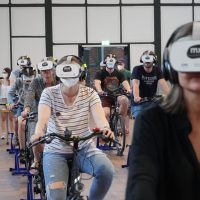
Excursion 1: Virtual Reality Bicycle Tour
With virtual reality glasses on your head and sitting on a bicycle, you can cycle through the Ruhr region in virtual space. The artistic virtual reality experience focuses on the past, present and future of the Ruhr region. The focus is particularly on the transport routes of the Metropole Ruhr. The visitors will move through time and space. They will encounter different means of transport that were or will be important in the different eras.
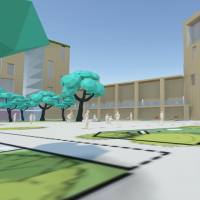
Excursion 2: Designing and building in virtual reality
Walking through a three-dimensional design of a building, a street or a park virtually with VR glasses is a great way to convey realistic spatial impressions. But there is more: virtual reality technology can be used already in the design process. Following this approach, the 3D models are not first created with mouse, keyboard and screen, but directly in three-dimensional space. In addition to VR goggles and controllers, the tools of design here are one’s own hands.
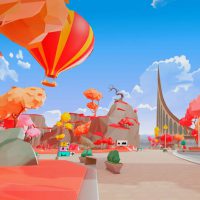
Excursion 3: A visit to the Metaverse
The term metaverse describes a shared digital space that exists permanently and consistently.
and consistent. A guide accompanies you on this excursion into the so-called “Decentraland” and gives you a slight idea of what the future Metaverse could look like. However, it is already apparent that this future digital space will have much more in common with an urban landscape than all the digital spaces we have known so far.
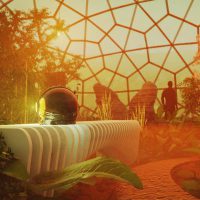
Excursion 4: Plants in Space
In modern cities, plants are cultivated in unusual places and under challenging conditions. With Valentin Fleckenstein’s VR experience, we take this development several steps further in thought – into space. Astrobotany is both a vision of the future and a science that addresses the possibilities, challenges and ethical issues associated with growing, cultivating and using plants in extremely hostile conditions. This virtual excursion into space fundamentally questions the relationship between humans, plants and nature.
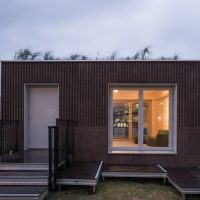
Adaptive building
The start-up Futur2K wants to massively reduce the enormous CO2 emissions of the building sector. Their building kit is climate-positive and made of natural building materials. Following their vision, the buildings of the future are composed of 22m² units that can be combined to form buildings of any size. A prototype of the smallest building unit can be viewed in virtual reality and combined into a building of any size.
Hackathon in Residence
Besides workshops, a week-long hackathon is a central part of the programme. People have applied from all over the world. 20 of these applicants have been invited to Gelsenkirchen from all over Europe, including the Netherlands, Great Britain, Slovenia and France. In mixed teams of architects, landscape architects, programmers and artists, they will work together for a week on site on concrete solutions for the digital and sustainable city.
The challenges the interdisciplinary teams are working on are concrete tasks on the festival grounds. How can underground infrastructure be made visible, for example? What are solutions to avoid large-scale land sealing in the future? How can urban spaces be used better and more efficiently and what influence do grey and green actually have on our health?
The results of the working week can be discovered and tested during guided tours in the festival area on 16 & 17 September. In a walk of just under 20 minutes from the Science Park along Bochumer Straße, the prototypes developed by the teams during the week can be experienced and shown in the direct context of the neighbourhood. Those who cannot or do not want to take part in a guided tour can also explore the Hackathon spots on their own.
Our participants
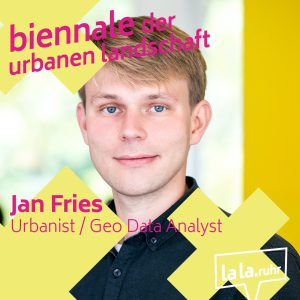
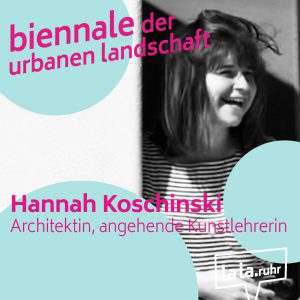
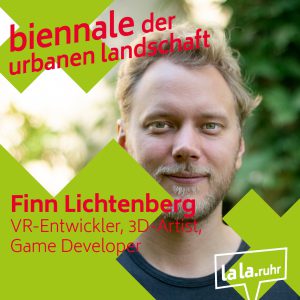
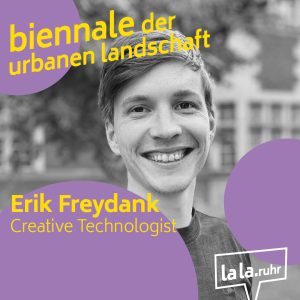
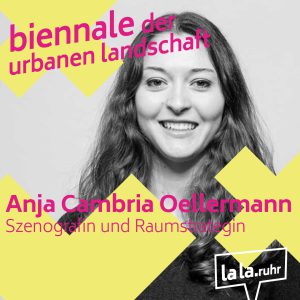
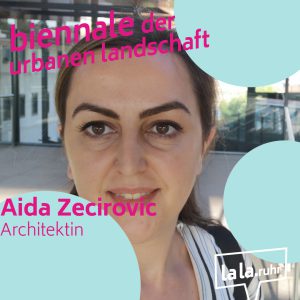
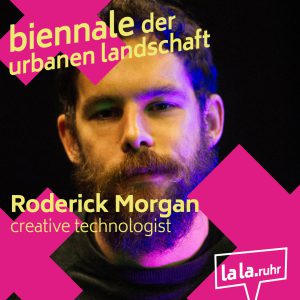
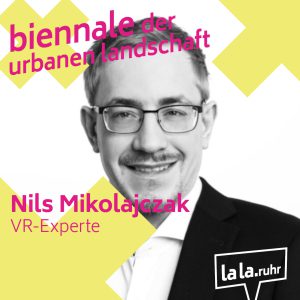
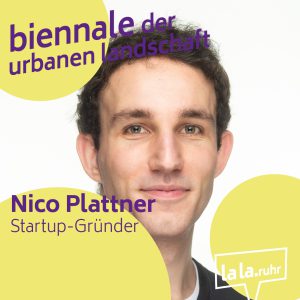
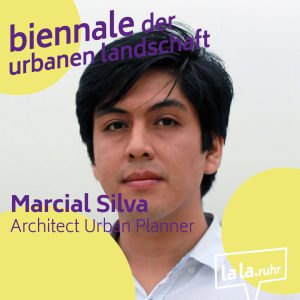
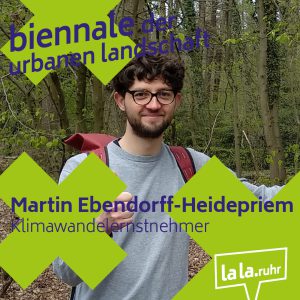
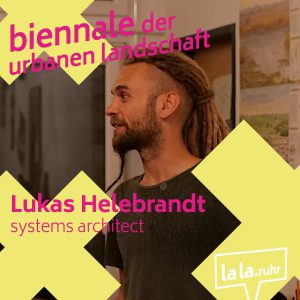
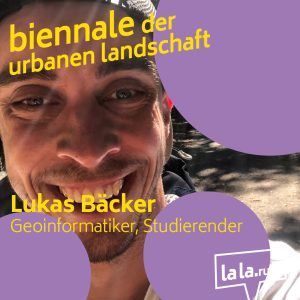
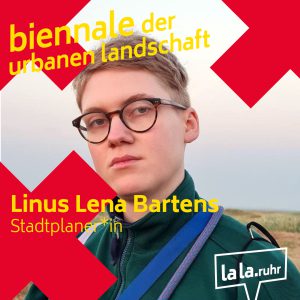
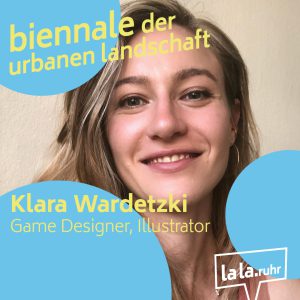
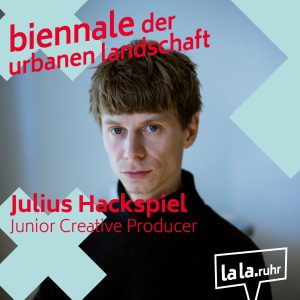
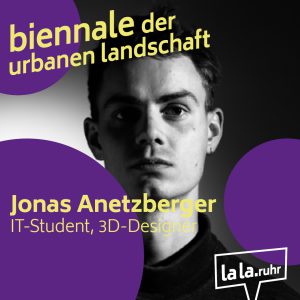
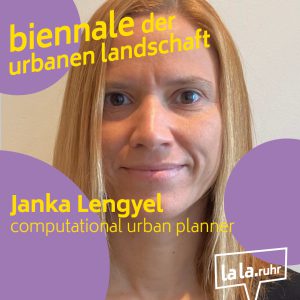
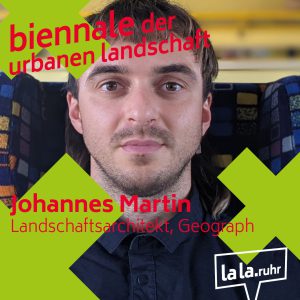
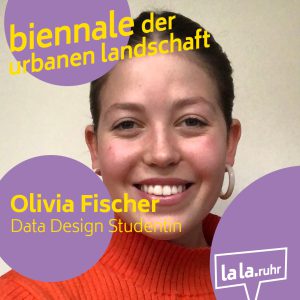
Jury
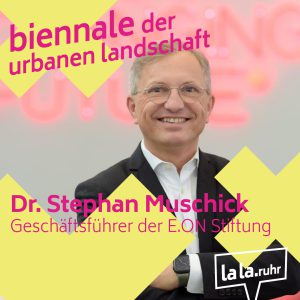
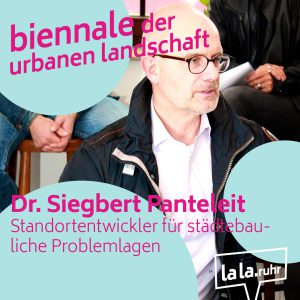
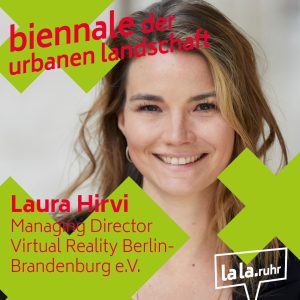
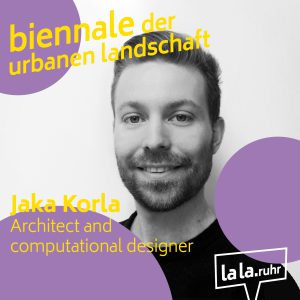
Our urban landscape biennial programme is sponsored by Eon Stifung.
